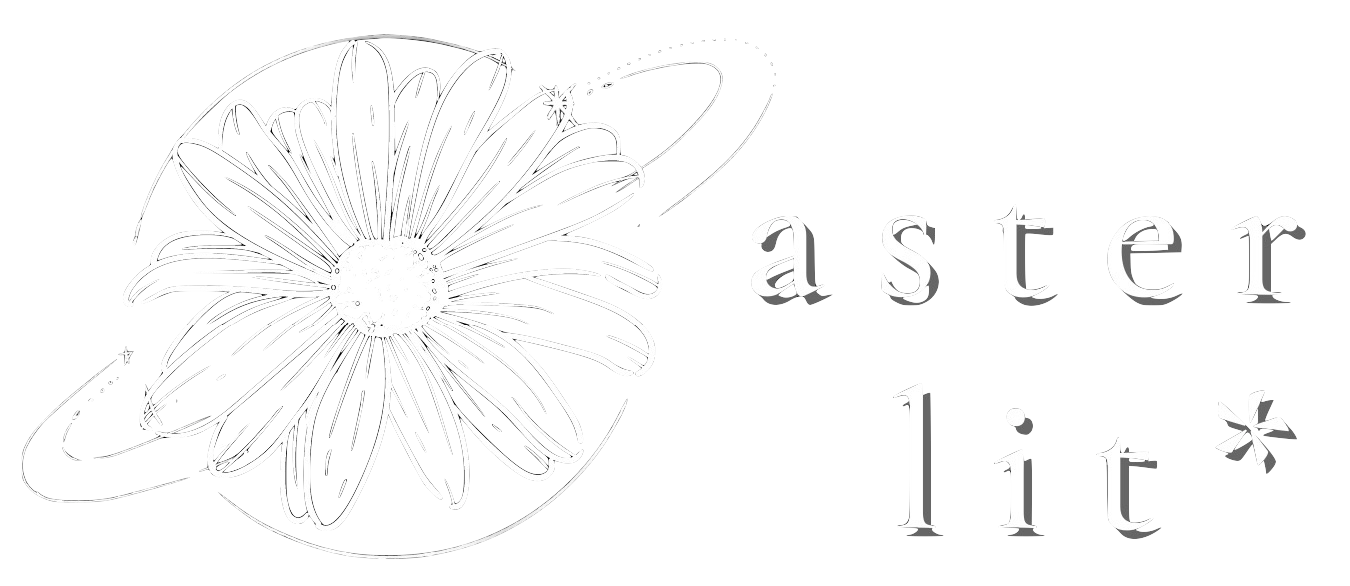
Aster Lit: translatability
Issue 12- Summer 2024
Art as Mistranslation.
Lucien
For the first time,
I notice death in the negative space* behind my body—
and not just in the imaginary universes in my poems.
Jessica Kim
Wavelength // Waveless
*One time while recording a podcast for Aster Lit as a host, so many conversations flew by my head that it almost felt impossible to find space for myself to speak. Even when silence fell as the others waited for me to speak, my mouth was already jammed full with words to contribute to the image they had already painted so clearly for the context of the podcast.
However, I remember times when I felt my presence, mine and mine alone, on a sheet of paper. When I was alone with nothing but the mood to write, all I did was hack away at going heart-to-heart with someone, creating an imaginary universe in poetry. At that moment, whenever I saw a trick of light or remembered the right word, the string of words that came out of me belonged to both the page and me. Yet, the more I continued writing and editing my poems, I realised that I was cutting out images which ‘dumbed down’ the poem and restated the obvious. For example, after writing an after poem for Jessica Kim’s poem “Wavelength // Waveless,” I overtly sketched emotions, causing readers to say that my poem was too clear-cut. They had, in their heads, painted the exact same image I had, and I realised that was what lost the magic of poetry; The magic that resided in making my experiences feel personal to the reader So, ultimately, the my joy from translating my feelings into words came from mistranslation. The moment a feeling becomes defined, its nature adapts into other’s minds as from the piece of my consciousness that I wrote.
Reading “Wavelength // Waveless,” the grief that Jessica Kim only indirectly said felt so personal to me. Sheerly by referencing eomma’s surgeries and the procedures she had to go through, the writing evoked feelings of confinement and personal turmoil through imagery alone. It felt like my imagination was playing tricks on me, mixing and matching the little amount of words on the screen to create such a gut-wrenching feeling.
We all have different experiences, judgements, and ways to interpret the world around us. We teeth through morsels of what we want, picking and choosing a vocabulary of names we want to remember. Art, then, is communication between our subconscious. All of our individual pictures conjured in our head when we think of ‘summer,’ ‘confession,’ and ‘loss’ are different. The stories we read are sifted from page to heart, mistranslating the words in themselves to our liking.
This idea of writing with space for a reader’s imagination and interpretation was so clearly seen when I was reading one of the Editorial Branch’s recommended readings, ‘Wavelength // Waveless’ by Jessica Kim. When she realises that her eomma was passing away, she described grief as being the grey area between her identities as a poet and daughter, deciding to eat her signature dishes despite how much she missed her and her acceptance of defeat against death. I especially related to how she realised that death, upon finally realising the gravity of eomma’s health crisis, became a negative space of her body. It was through understanding how grief is a universal emotion that she made enough room by using abstraction while still telling her story through her experiences that I teared up when she described how eomma’s palms felt, the logic behind clinging onto a person whose memory will only eat at you the more you think about it.
What a poet writes is just a palette of primary colours. We, as the readers, can paint our own pictures from that repertoire of vocabulary, translating and mistranslating a poem into art.
I am sure every reader had thousands of different reasons why this poem stuck with us.
The beauty of communicating with one another through art is not through directly addressing the writers’ feelings, but making readers realise their absence if left unsaid. And to show their absence requires subjective perception, mistranslation.
Now, every time I write, I bite words back in my mouth until my body has enough space to leave room for yours.
